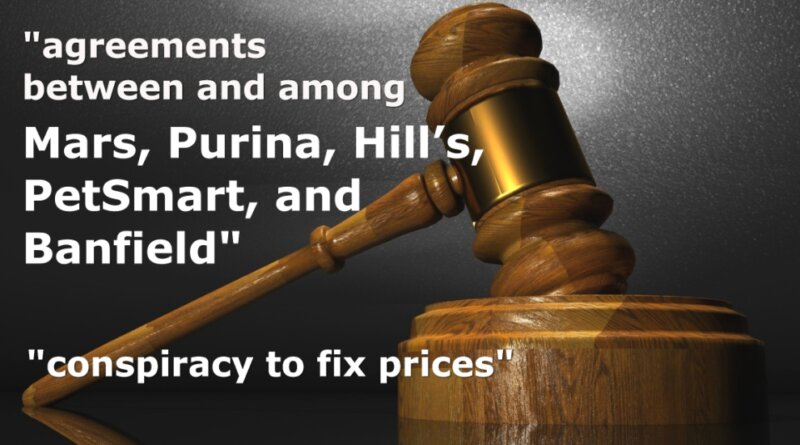Significant Hill’s Prescription Pet Food Lawsuit Will Continue – Truth about Pet Food
The lawsuit – Stevie Kucharski-Berger v. Hill’s Pet Nutrition – was originally dismissed. But thankfully an appeals court decided the “district court erred in dismissing” the case. This VERY interesting lawsuit will continue.
This lawsuit challenges the validity of prescription pet food, even indicating that Hill’s and other prescription pet food manufacturers conspired to charge high prices for per federal law adulterated and misbranded products.
“After learning that Hill’s prescription pet food has no medicine or drug, that no prescription is legally required to purchase it, and that it is not tested and approved for medicinal purposes by the Food and Drug Administration (FDA), Kucharski-Berger sued Hill’s alleging that Hill’s and other pet food manufacturers conspired to monopolize the prescription pet food market and to artificially inflate prices by self-imposing the prescription requirement.”
Background: Prescription Pet Foods DO violate federal law.
Prescription pet foods are given a ‘Get Out Of Jail Free’ card by the FDA Center for Veterinary Medicine (CVM). Federal law defines any product that makes a claim to cure, treat or mitigate disease as a drug. And the FDA CVM admits: “By virtue of their intended use to treat or prevent disease, such products meet the statutory definition of a drug.”
Drugs are required by federal law to prove their effectiveness and safety. Drugs are also held to strict manufacturing standards. Federal law also clearly states that a product that claims to cure or treat disease that did not meet the legal requirements would be adulterated and misbranded.
But prescription pet food isn’t held to federal law. The FDA Center for Veterinary Medicine allows prescription pet food to make claims to treat disease without proving effectiveness and safety – and without meeting manufacturing standards. This ‘Get Out of Jail Free’ card is accomplished through an FDA Compliance Policy Guide titled “Labeling and Marketing of Dog and Cat Food Diets Intended to Diagnose, Cure, Mitigate, Treat, or Prevent Diseases.” A Compliance Policy Guide (CPG) is FDA Center for Veterinary Medicine’s method to do things their way, not the legal way.
The FDA Center for Veterinary Medicine’s way with prescription pet food is to allow manufacturers to use food grade or feed grade ingredients (including ingredients sourced from diseased animals or non-slaughtered animals) and allows inferior feed grade manufacturing standards to make a product that claims to cure or treat a disease. Further, the FDA plays perfectly into the scam by requiring these unproven products to be sold ONLY by veterinarians.
This lawsuit challenges the entire concept of prescription pet foods AND challenges the high cost of these products.
Quoting:
“The prescription requirement does not make a product safe that is otherwise unsafe, it simply mitigates the harm that the food may cause due to the failure to gain FDA approval.”
“For example, Hill’s produces a Prescription Pet Food product called ‘Prescription Diet Urinary Care c/d Multicare’ cat food that sells for $5.62 per pound, and another substantially similar non-prescription product called ‘Adult Urinary Hairball Control’ cat food that sells for $3.51 per pound. The two products make essentially the same health claims and have a 75 percent overlap in ingredients. The non-overlapping ingredients are not drugs and are not sufficient to justify one product being sold by prescription for a significantly higher price. Given the overlap in ingredients, and the absence of any drug or other ingredient required to be sold by prescription in the Prescription Pet Food product, the only meaningful distinction between the two products that is apparent to Plaintiffs and those similarly situated is the prescription requirement. The price differential is therefore based largely, if not entirely, on the prescription requirement imposed by Hill’s and the other manufacturing conspirators in the combination.”
The lawsuit claims that Hill’s Pet Food engaged in “deceptive acts and practices in connection with the sale and advertisement of Prescription Pet Food in trade or commerce in the State of Kansas by misrepresenting and marketing and selling Prescription Pet Food through a knowingly deceptive, misleading, and self-imposed prescription requirement having no legal basis or mandate.”
And the lawsuit alleges that Hill’s and other major prescription pet food manufacturers worked together to control the prescription pet food market and prices.
“Kucharski-Berger later proffers in her petition that she has been ‘informed and believes that agreements between and among Mars, Purina, Hill’s, PetSmart, and Banfield prohibit and restrict PetSmart and Banfield from stocking and selling Prescription Pet Food made by other competitors.’ In furtherance of this conspiracy, ‘Hill’s entered into a merchandising agreement with PetSmart and Banfield, which Mars and PetSmart owned, to sell Hill’s Prescription Pet Food in all PetSmart stores with an on-site Banfield pet hospital.’ She alleges that although Mars had the power to exclude Hill’s from PetSmart and Banfield, it entered into the merchandising agreement against its economic interests, but as part of the previously noted agreement to control the market. Purina later joined the conspiracy. She alleges that Hill’s and its coconspirators have intentionally blocked smaller prescription pet food manufacturers from selling in PetSmart and Banfield stores.”
And specific to the price fixing, this appeals court ruling drops a huge bomb. The court stated:
“Hill’s argues that Kucharski-Berger failed to allege direct evidence of a trust or conspiracy to fix prices.”
“But Kucharski-Berger did allege a specific meeting in March 2005 where the issue of the prescription requirement was discussed and agreements were made – the purpose and effect of which was ‘raising, fixing, stabilizing and pegging prices of Prescription Pet Food.’ The central theme was to agree that they would support the prescription requirement to keep prices inflated. This alone provided enough detail to put Hill’s on notice of what conduct it was alleged to have participated in. And if true, it is certainly the ‘smoking gun’ that Hill’s argues is necessary to support a conspiracy claim.”
We can be thankful to the appeals court for upholding this lawsuit. We will certainly be following this lawsuit as it proceeds, looking forward to evidence as it unfolds. As more court documents are posted, they will be shared.
To read the court document Click Here.
Personal Opinion: Thank heaven for the lawyers that are fighting the injustices of pet food. I hate to think of where we’d be without them.
Wishing you and your pet(s) the best,
Susan Thixton
Pet Food Safety Advocate
Author Buyer Beware, Co-Author Dinner PAWsible
TruthaboutPetFood.com
Association for Truth in Pet Food

Become a member of our pet food consumer Association. Association for Truth in Pet Food is a stakeholder organization representing the voice of pet food consumers at AAFCO and with FDA. Your membership helps representatives attend meetings and voice consumer concerns with regulatory authorities. Click Here to learn more.
What’s in Your Pet’s Food?
Is your dog or cat eating risk ingredients? Chinese imports? Petsumer Report tells the ‘rest of the story’ on over 5,000 cat foods, dog foods, and pet treats. 30 Day Satisfaction Guarantee. Click Here to preview Petsumer Report. www.PetsumerReport.com
Find Healthy Pet Foods in Your Area Click Here

The 2021 List
Susan’s List of pet foods trusted to give her own pets. Click Here to learn more.





medicine prednisone 5mg prednisone 50mg cost 2.5 mg prednisone daily
darknet search engine dark internet
tor market darkmarket
how to access dark web darkmarket 2023
darkmarket dark web market links
darknet seiten dark market url